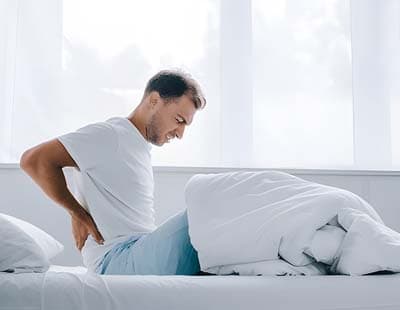Sometimes, headaches can occur when sleeping at night due to problems such as sinus pressure, migraine, tension, and even sleep apnea. Sometimes, these headaches worsen because of posture or develop under the same conditions brought on by blood circulation or muscle strain. Consult a doctor if it persists. Headaches that occur in a lying down position are relatively common.
Statistics about this problem are scarce. However, it is estimated that close to 12% of the general population will suffer from chronic headaches. Of those, most are migraines, tension headaches, or sinus issues that a lying-down position may exacerbate.
This is generally true for most sleep-related headaches. A significant percentage of patients suffering from chronic headaches often complain of headaches during sleep or after waking. Some conditions, like sleep apnea, may cause headaches while lying down.
Causes of Headache When Lying Down
Understanding the root causes can help manage or prevent these headaches. Below are some of the most common causes, along with how to relieve head pressure when lying down:
1. Sinus Pressure
Congestion or inflammation in the sinus cavities generally provokes headaches, especially when lying down. This is because it can increase the pressure of the sinuses, causing a pounding headache in the forehead, cheeks, or around the eyes. This is especially true among people with sinus infections, allergies, or the common cold.
Treatment
Decongestants: Over-the-counter nasal decongestants or antihistamines can help reduce sinus inflammation.
Saline Nasal Spray: Helps clear out mucus and allergens from the sinuses.
Steam Inhalation: Breathing in steam from a hot shower or bowl of hot water can help loosen mucus.
Warm Compress: Applying a warm compress to the face or sinuses can alleviate pressure and pain.
Prevention
Allergy Management: If your headaches are triggered by allergens, managing your allergies with prescribed medications or lifestyle changes can help.
Regular Hydration: Staying well-hydrated can prevent mucus from thickening and clogging sinuses.
Humidifier Use: A humidifier in your bedroom can prevent your sinuses from drying out, especially in winter.
2. Migraines
Certain body positions, such as lying down, sometimes activate or worsen migraines due to increased blood flow or internal pressure changes within the head. Most migraine attacks present with characteristic symptoms of nausea, increased sensitivity to light and sound, and throbbing pain, and lying down tends to exacerbate these conditions.
Treatment
Pain Relievers: Over-the-counter pain relievers like ibuprofen or aspirin or prescription medications such as triptans can help relieve migraine pain.
Anti-nausea Medications: If nausea accompanies migraines, anti-nausea medications may be prescribed.
Cold Compress: Applying a cold compress to the forehead or neck can sometimes reduce migraine intensity.
Prevention
Migraine Triggers: Identify and avoid known triggers (e.g., certain foods, bright lights, stress, dehydration).
Medication: For frequent migraines, preventive medications (e.g., beta-blockers, anticonvulsants, or antidepressants) can help reduce the frequency and severity.
Sleep Hygiene: Establish a regular sleep schedule to prevent migraine episodes linked to poor sleep patterns.
3. Tension Headaches
Tension headaches are usually localized to the neck, shoulders, and scalp. You may get worse when you lie down, possibly because your sleeping is poor or strained. Tension can sometimes result in poor posture or stress, contributing to tight muscles and headache pain spikes when you rest.
Treatment
Over-the-Counter Pain Relievers: Ibuprofen, acetaminophen, or aspirin can help alleviate the pain from tension headaches.
Massage: Massaging the neck, shoulders, and temples can help relieve muscle tension.
Heat or Cold Therapy: Applying a hot or cold compress to the neck or head can reduce muscle tightness and soothe pain.
Prevention
Good Posture: To help people reduce stress on the neck and shoulder muscles, try to have good posture, especially when sitting or working at a desk.
Stress Management: The use of relaxation techniques- meditation, yoga, or deep breathing exercises - has been shown to significantly reduce the chances of getting tension headaches.
Regular Exercise: Regular physical activity relieves muscle tension and reduces stress, both of which will help prevent tension headaches.
4. Sleep Apnea
One is sleep apnea, which refers to a temporary short period without breathing, with the normal breaths occurring after the period of apnea during the sleep state. Sleep apnea exists because there are blockages in the airway, leading to low amounts of available oxygen, often causing headaches in the morning, close to the time of lying down, or upon waking from sleep.
Patients who experience sleep apnea often have headaches due to poorly regulated sleep cycles, most often with a limited amount of breathing (oxygen) occurring in the night.
Treatment
CPAP Therapy: CPAP therapy uses a mask that helps to keep the airway open during sleep.
Oral Appliances: Dental appliances (also referred to as 'mouth guards') reposition the jaw and/or tongue to allow for airflow for mild sleep apnea.
Weight Loss: Consider weight loss if applicable, as excess weight can worsen the airway obstruction and lead to more significant symptoms of the sleep apnea.
Prevention
Sleep Position: Try to avoid sleeping on your back, as this sleeping position can worsen the sleep apnea. Try to sleep on your side, it might help.
Healthy Habits: Being of a healthy weight, avoiding alcohol, and quitting smoking can reduce your risk of sleep apnea.
5. Increased Blood Flow
When you lie down, blood flow to the head may also increase, which may sometimes lead to a headache (particularly in those predisposed to migraines and in other vascular headaches).
Lying down may change the position of some blood vessels in the brain to dilate or constrict, which can lead to symptoms of throbbing-like pain or pressure pain.
Treatment
Pain Relievers: Nonprescription medications such as ibuprofen or acetaminophen may help relieve pain related to increased blood flow.
Relaxation Techniques: By lessening stress and/or tension, this will help lessen the vascular changes of the headache.
Prevention
Avoiding Triggers: If lying down triggers headaches, try using pillows to prop yourself up slightly instead of lying flat.
Hydration: Drink plenty of water during the day to prevent dehydration, which can worsen headache symptoms.
6. Caffeine Withdrawal
You would probably experience withdrawal pain if you consumed caffeine regularly and experience withdrawal pain if you lie down without caffeine, especially if you were lying down for the first time, because your position is magnifying the caffeinated experience.
Caffeine is a stimulant, and it causes constriction of blood vessels; withdrawal from caffeine causes blood vessels to gradually dilate and is thought to cause headaches.

Treatment
Gradual Reduction: Gradually decrease your caffeine use to prevent withdrawal symptoms such as headaches.
Pain Relievers: The use of over-the-counter painkillers may relieve headache pain during withdrawal.
Prevention
Moderate Caffeine Intake: Prevent withdrawal by avoiding too much caffeine and maintaining a regular amount consumed each day.
Stay Hydrated: Consume a lot of water to prevent dehydration, which can amplify caffeine withdrawal headaches.
7. Hypnic Headaches
Hypnic headaches are rare during sleep and occur most often in the elderly. They are "alarm clock headaches" that awaken the patient and can last for as long as one hour. Hypnic headaches do not appear to have a specific etiology, but related alterations in sleep patterns may be involved.
Treatment
Caffeine: On occasion, a small amount of caffeine taken just before going to sleep will prevent hypnic headaches.
Medications: Some medications, such as indomethacin or lithium, can be prescribed to control chronic hypnic headaches.
Prevention
Sleep Hygiene: Engage in a regular sleep schedule, as an irregular sleep cycle may cause hypnic headaches.
Caffeine Intake: Taking a moderate amount of caffeine prior to sleeping might decrease the frequency of hypnic headaches.
8. Rebound Headaches
Extensive overuse of pain medication, such as prescription drugs and over-the-counter pain relievers like ibuprofen or acetaminophen, leads to rebound headaches. They typically tend to worsen while lying down.
They occur as the body gets accustomed to the medication to ease the headache and then attempts to alleviate it when it ceases to use it to mend the body.
Treatment
Gradual Withdrawal: Gradually taper off the use of pain medications with the supervision of a physician to prevent withdrawal.
Preventive Medications: A doctor can prescribe preventive medications, including antidepressants or anti-seizure drugs, to slow down the occurrence of rebound headaches.
Prevention
Restrict Pain Medication Use: Steer clear of frequently using over-the-counter or prescription pain drugs. If you must take painkillers regularly, see a physician.
Non-Medication Measures: In order to treat headaches without medication, seek alternative treatments such as relaxation therapy, physical therapy, or acupuncture.
9. Postural Headaches
Seated at a computer or desk, poor posture can strain the muscles of the neck and upper back. It can also lead to headaches when in bed, particularly if the person is used to poor posture or activities that strain the muscles in the neck and shoulders.
Treatment
Correct Posture: Change your sitting or sleeping position to prevent straining the back and neck muscles.
Pain Relievers: Over-the-counter pain relievers may ease discomfort due to muscle tension.
Prevention
Ergonomic Adjustments: Create an ergonomic working area to ensure correct posture when working or on a computer.
Regular Stretching: Stretch neck and back muscles frequently to prevent muscle tension and headaches due to posture.
10. Dehydration
Being dehydrated might be more severe when lying down, and it leads to headaches. At times, particularly at night, a heightened need for water consumption can be overlooked; thus, dehydration headaches can have an increased severity when lying down.
Treatment
Rehydration: Take plenty of water to bring fluid balance back into your system. Oral rehydration fluids are also useful if you're very dehydrated.
Electrolyte Solutions: For severe dehydration, drinking fluids containing electrolytes can restore balance and alleviate headache symptoms.
Prevention
Regular Water Intake: Prevent dehydration by drinking water regularly throughout the day, not only when thirsty.
Avoid Alcohol and Caffeine: These tend to dehydrate and cause headaches when one is sleeping.
11. Cluster Headaches
Cluster headaches are a fairly uncommon but painful form of headache that usually occurs at night or while one is in a recumbent position. They are usually one-sided, that is, on one side of the head, and manifest as "clusters" of frequent, severe attacks over weeks or months.
The etiology of cluster headaches is not fully understood. Nevertheless, scientists believe that it is related to hypothalamic dysfunction.
Treatment
Oxygen Therapy: Breathing pure oxygen from a mask can ease the severe pain of a cluster headache.
Triptans: Drugs like sumatriptan effectively cure cluster headaches during an attack.
Steroids: Corticosteroids on a short-term basis may be prescribed to decrease inflammation during a cluster headache bout.
Prevention
Preventive Medications: To lower the number of attacks, medications like verapamil (calcium channel blocker), lithium, or topiramate may be prescribed.
Avoid Triggers: Avoid smoking or alcohol use, which are frequent triggers of cluster headaches.
12. Gastroesophageal Reflux Disease (GERD)
GERD is a gastrointestinal disorder in which stomach acid bothers the esophagus. Patients are likely to experience headaches when they lie down. At times, acid reflux pain may bring on tension or even vascular headaches, especially if the patient lies down too early after a meal or in case the symptoms of GERD tend to worsen at night.
Treatment
Antacids or Proton Pump Inhibitors (PPIs): Medications that lower stomach acid and prevent acid reflux, which can decrease headache frequency.
Elevate Head During Sleep: Supporting your head when in a reclining position can lower the chance of acid reflux, which can ease headache pain.
Prevention
Avoid Trigger Foods: Steer clear of spicy, acidic, or greasy foods, which can cause GERD symptoms and possibly lead to headaches.
Small Meals: Consume smaller-sized meals and eat at regular intervals but not close to sleeping time, to prevent acid reflux during sleep.
Can Pillows Cause Headaches?
Certainly, a pillow is regarded as a headache factor if it does not provide orthopedic support for your head and neck. If a pillow is too high, too low, or too firm, the neck muscles will stretch out, resulting in spinal misalignment, which will cause tension headaches and/or aggravate headaches associated with migraines.
Further, pillows made from poorly fitting materials with the curved shape of the neck can easily lead to bad sleep postures, which is one of the most common causes of waking up with a morning headache. A pillow that supports the head and neck in a neutral position can do the trick.
Pillows for Headaches/Migraine
The right pillow can help reduce headaches and migraines by providing proper neck and head support.
Cervical Pillows: Designed to support the natural curve of your neck, preventing muscle strain.
Memory Foam Pillows: Conform to your head and neck, offering personalized support to maintain alignment.
Water-Based Pillows: Adjustable firmness for custom support and comfort.
Cooling Pillows: Help regulate temperature, which can reduce heat-triggered migraines.
Wedge Pillows: Elevate the head to alleviate sinuses or acid reflux pressure.
Final Thoughts
Many factors, including sinus problems, migraines, tension, and sleep apnea, can cause this type of headache associated with lying down. Treatment starts with proper diagnosis since appropriate remedies may involve lifestyle changes, medication, or improving sleeping habits. Even basic measures such as staying hydrated, managing stress, or changing posture while sleeping can heal or prevent that headache.
If the above measures don't work to alleviate the headaches or make them any worse, you must see a doctor. Severe and persistent headaches may indicate a serious condition that must be diagnosed and treated under proper medical care to relieve it.






















